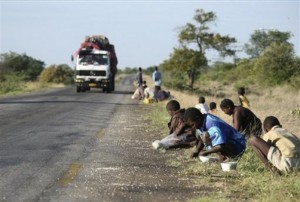FARM-INPUT SUPPLIERS CONTRIBUTING TO POVERTY
Published on July 29, 2011 at 1:56 PM by FACE OF MALAWI
By Our Correspondent
Multinational farm input suppliers are the ones contributing to household poverty among poor women farmers in Malawi through their trading practices. At last the poor women have realized that without money they cannot buy hybrid maize seed to plant. It is common knowledge that hybrid seed is high yielding. Every villager in Malawi knows that failure to buy and plant hybrid seed is inviting famine in the home. This is the reason many poor women farmers have changed from planting traditional maize varieties to hybrid seed.
A lady subsistence farmer recently remarked, “I never planted hybrid maize seed in my garden and the result was that my home was always having food shortages. Last year I planted hybrid maize seed and now I have a lot of maize”. Her male counterpart responded;” I have not been able to buy hybrid seed because it is expensive; therefore, I just plant traditional varieties. You are lucky because you have a brother who is working in the bank.” The lady farmer, named Agnes Cheyo, nodded in agreement during an informal discussion.
Agnes explained that if it were not for her brother she should not have been able to change from planting traditional maize varieties to hybrid seed. She went on to explain; “Although I have harvested more maize than last year, my problem now is money to buy pesticide. With the traditional maize I never applied pesticide to protect the maize from weevil damage. I do not think it is advisable to ask my brother for money to buy the pesticide.”
The male farmer, named John Elias, warned: “If you do not apply pesticide to your maize then all of it will be damaged by weevils.” It is better you sell two bags to those who did not harvest enough to raise money to buy the pesticide. Agnes responded; “Who has money to buy the maize from me in this village”? Due to good rains and fertilizers, almost everyone in this village has some maize thereby reducing market demand.
Richard Chisale a former University of Malawi graduate joined the discussion; “The problem is overproduction. Every citizen, including chief executives in Blantyre and Lilongwe, has maize gardens, then who is going to buy our maize from the villages?”
This is the problem in our country because everyone wants to become a maize farmer. It is different from the situation in South Africa where farmers and consumers are different.
John explained; “I think that planting hybrid maize seed is very expensive when you add the cost of buying the seed, fertilizers, pesticide and the need to buy new planting seed every year as hybrid seed cannot be recycled.”
Agnes wondered: “Does it mean I will not select my seed from this crop next year?” John replied; “No you cannot recycle hybrid seed.”
When looked at from economic benefits, it is the multinational farm-input suppliers who benefit more than the poor women farmers in Malawi. The poor woman who toil in their garden under roasting sun do not benefit as much as the multinational farm input suppliers. This explains the need for poor farmers to start using organic manure. Organic manure does not require yearly application thereby saving costs. It is also advisable for farmers to use open pollinated varieties (OPV) seeds which can be recycled. Unfortunately, seed traders in the country do not advertise open pollinated seeds (OPV) as aggressively as they do to hybrid seed.
It is fair to blame the multinational farm-input suppliers for contributing poverty to the poor women farmers in villages in Malawi. The poor women are being used for profit optimization by the multinational companies without any form of corporate social responsibility to help alleviate the suffering. Before the hybrid seeds, farmers recycled their maize seed, they did not use chemical fertilizers and pesticides to fumigate their harvested maize. The added costs out weigh the benefits of food security which everybody talks about as the long term effect is that the poor are made more vulnerable than before.
Subscribe to our Youtube Channel:


